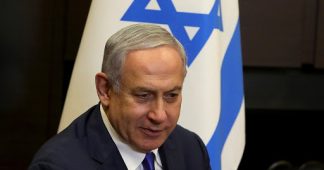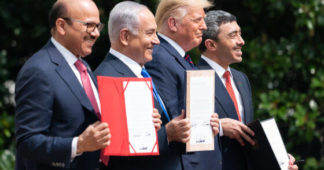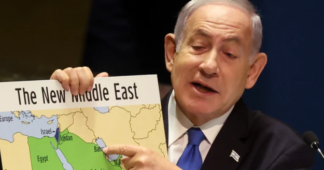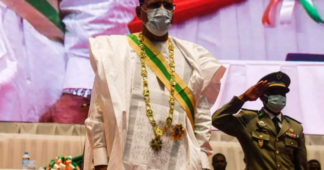The war in Gaza has overshadowed the normalisation agreements signed in 2020 between Israel, the United Arab Emirates, Bahrain and Morocco. Beyond its geopolitical dimension, one aspect of this alliance has been overlooked: despite their theological differences, the fundamentalists of the three great monotheisms have taken advantage of it to form a common front against moral liberalism and secular values – even if Israeli repression in East Jerusalem and violations of holy places also threaten this aspect of the pact. (This text was written before the recent events in the region)
By Hicham Alaoui
18 October 2023
When the Abraham Accords are signed in 2020, critics have condemned the Abraham Accords as a cynical manoeuvre in geopolitical opportunism. The US under the Trump administration needed to revive its waning hegemonic power by brokering new Arab-Israeli peace treaties, which bolstered its anti-Iranian stance while strengthening its Arab allies. In turn, those Arab allies – namely the United Arab Emirates, Bahrain, and Morocco – dangled the prospects of normalisation with Israel to obtain new trade agreements, military assistance, and other special dispensations. Morocco built upon its own specificity in having a heritage of an historically prominent Jewish minority to justify closer ties with Israel and believes that movement towards Israel will relieve all pressures upon it regarding Western Sahara.
For its part, Israel gained newfound standing in the international community on account of its new settlements with other Arab countries, who also not uncoincidentally share its aims of containing a nuclear-armed Iran. Above all, all these actors exploited the marginal status of the Palestinian cause, which had been disconnected from regional politics during the localised uprisings of the Arab Spring. In essence, the Abraham Accords were the ultimate example of cynical realpolitik, even if other Arab states are still calculating their next strategic moves. Algeria is wagering that the Accords will fail, while Qatar prefers to remain above the regional fray by serving as a medianormalisationtor, much as it did in Afghanistan.
Yet, while the new round of Israeli-Arab agreements began as an exercise in geopolitical opportunism, it has morphed into something else entirely. The strategic logic that produced these treaties only minimally holds now. As the US retreats from the Middle East, many regional states no longer need American validation to craft peace and undertake bold foreign policies.
The common fear of Iranian aggression is no longer sufficient to explain Israeli-Arab normalisation, because the recent Saudi-Iranian rapprochement has not undermined mutual enthusiasm. Indeed, while Saudi Arabia is wary of its symbolic position as caretaker of the two holiest Islamic cities, it is also quietly bargaining through the Biden administration to extract the highest price possible for making a separate peace with Israel. Likewise, realpolitik suggests that some Arab states entertain strategic alliances with Israel to improve their economic or political position. However, pure realism also would dictate that bargaining for peace should come in slow, incremental steps rather than the sudden, spectacular signing of the Accords.
The Abraham Accords are now sustained by a different factor apart from geopolitics – religious radicalization. It draws together an unexpected coalition of political forces that claim to speak on behalf of their faith through a specific formulation of fundamentalist ideals. For them, the use of the Prophet Abraham’s name in their titular peace treaties once emphasised ecumenical tolerance between the Jewish, Christian, and Muslim faiths. Now, it signals an extremist alliance against liberal democracy.
Each of these actors has become predominant in their respective political contexts. In Israel, right-wing Jewish fundamentalists dominate the government, and dictate the country’s position on the Palestinian question. In the US, the evangelical wing of the Republican Party has a tight grip upon the conservative movement, and is fused as well with the uniquely populist appeal of Trump’s ‘Make American Great Again’ (MAGA) movement. For the Arab states that signed the Accords, it is more complex. Here, authoritarian rulers have maintained state control over Islam from religious actors anchored in society, from the traditional ’ulama to fundamentalist groups like Islamists and Salafists. They claim to support a moderate version of Islam, but in fact enforce state-based fundamentalism. They reject secularisation in the philosophical sense, and instead monopolise and regulate the practice of the Muslim faith in social life.
All three forces represent the winning political factions in their respective societies. Their views upon each other have also rapidly transformed. Until recently, representatives of these great faiths saw the others as rivals. Christian and Muslim anti-Semitism targeted the Jewish diaspora, while Zionists saw most Christians and Muslims as an inherent threat to their dream of a Jewish homeland. Terms like crusade and jihad flavoured how each fundamentalist wing approached this so-called clash of civilisations. In this Huntingtonian framework, religiosity was seen as the foundation of culture, and even secularised people raised in each respective faith were treated as co-religionists. There was less difference between a French Freemason and French bishop than the bishop and Imam.
Today, however, such inter-religious competition has been replaced within the fundamentalist wings with a deeper, collective struggle for cultural authenticity. These culture wars have replaced the old Huntingtonian paradigm of civilisational conflict. Now, each religious faction sees no problem allying with their distant Abrahamic cousins against their closest siblings – fellow Jews, Christians, or Muslims who disagree with their theology, and who criticise their politics. In America, Christian evangelicals see secular liberalism as a threat that ranks equal to, or even greater, than any other competing faith. Christian fundamentalists are building a global coalition of religious conservatives from all faiths to combat the atheist foe. They ally with European populists, draw upon white nationalism, remain suspicious of any leftist politics, and even lionise Vladimir Putin as a Christian crusader.
At the same time, ultra-Orthodox Jewish groups have shaken Israeli politics. The tensions between these movements and secularised Jews are such that the former no longer see the latter as Jewish. They no longer rally to defend the global Jewish diaspora from anti-Semitism, because much of that diaspora has either secularised or else rejects their political and theological views. Thus, this Jewish fundamentalist wing sees no contradiction allying with the same anti-Semitic Western populists that also back white Christian nationalists. For instance, Netanyahu has called Victor Orban, despite his anti-Semitic attacks against George Soros, as a true friend of Israel. More recently in May 2023, a delegation from the far-right Sweden Democrats Party, whose platform calls for a ban on circumcision, toured Israel.
In the Gulf, the Arab states that once claimed to represent global Islam have similarly retrenched. In Saudi Arabia, Muhammad bin Salman has abandoned the old Saudi posture of advancing Salafist-inflected ideals through soft power. While the Saudi state still serves as custodian of Mecca and Medina, neither its leaders nor most other Arab governments maintain the religious stances of the past that once propelled their political demands upon the world. They no longer make common cause with the Palestinian plight. Neither do they rush to the defence of Muslims suffering Islamophobia in the West or Muslim minorities under attack elsewhere, as in the Uighurs in China.
These three radicalised religio-political actors hold deep hostility against democratic voices in their own societies. For the Jewish fundamentalists in Tel Aviv, the enemy is the secular Jewish mainstream that seeks to restrain the worst excesses of Zionist expansionism into Palestine, as well as the ultra-Orthodox capture of the Israeli state. American evangelicals loathe the liberal advocates of cosmopolitanism and political inclusion, which threatens to globalise a nation which they believe should remain radically white-dominated. And the Arab states dread the threat of popular mobilisation for dignity embodied by the Arab Spring, and still carried by so many young people, who see modern politics as requiring a commitment to toleration and human rights.
For all three groups, the Abraham Accords represent a convenient junction of interests. The Israeli side can proceed with annexing Palestine, the American evangelicals can entrench their putative defence of Western civilisation, and the Arab regimes can strengthen their technological and military capabilities. It is this coalition of radicals that sustains the Abraham Accords.
And yet, the Accords are imperilled by an unexpected challenge. It was always naïve to think that these religio-political forces would remain in harmonious equilibrium. That equilibrium is being punctured in Israel – the one Middle East country that has liberal institutions, save for its mistreatment of Palestinians. Thus, Israeli democracy has become the weakest link in this edifice. Repeated mass mobilisation against Netanyahu’s authoritarian power grab has unleashed political turmoil, potentially heralding a new cycle of governmental instability, snap elections, and leadership change.
This liberal campaign against the increasingly exclusionary and abusive nature of the Israeli state hints at deeper contradictions within the new alliance of radicalism. Hardline Zionists in Israel see no problem with attacking Christians through the complicity of their judicial and police institutions. Yet even they must confront the reality that in the outside world, Christian evangelicals see them as a mere way station on the road to the Messiah’s return. Likewise, the repeated attacks against Al-Aqsa symbolise not just the dispossession of Palestine, but a spiritual assault on the entire Muslim world and its faith. In this sense, the entire regional framework is threatened with collapse under the weight of its own paradoxes.
* Hicham Alaoui is the founder and director of the Hicham Alaoui Foundation. His recent publications include Pacted Democracy in the… (continue)
We remind our readers that publication of articles on our site does not mean that we agree with what is written. Our policy is to publish anything which we consider of interest, so as to assist our readers in forming their opinions. Sometimes we even publish articles with which we totally disagree, since we believe it is important for our readers to be informed on as wide a spectrum of views as possible.











